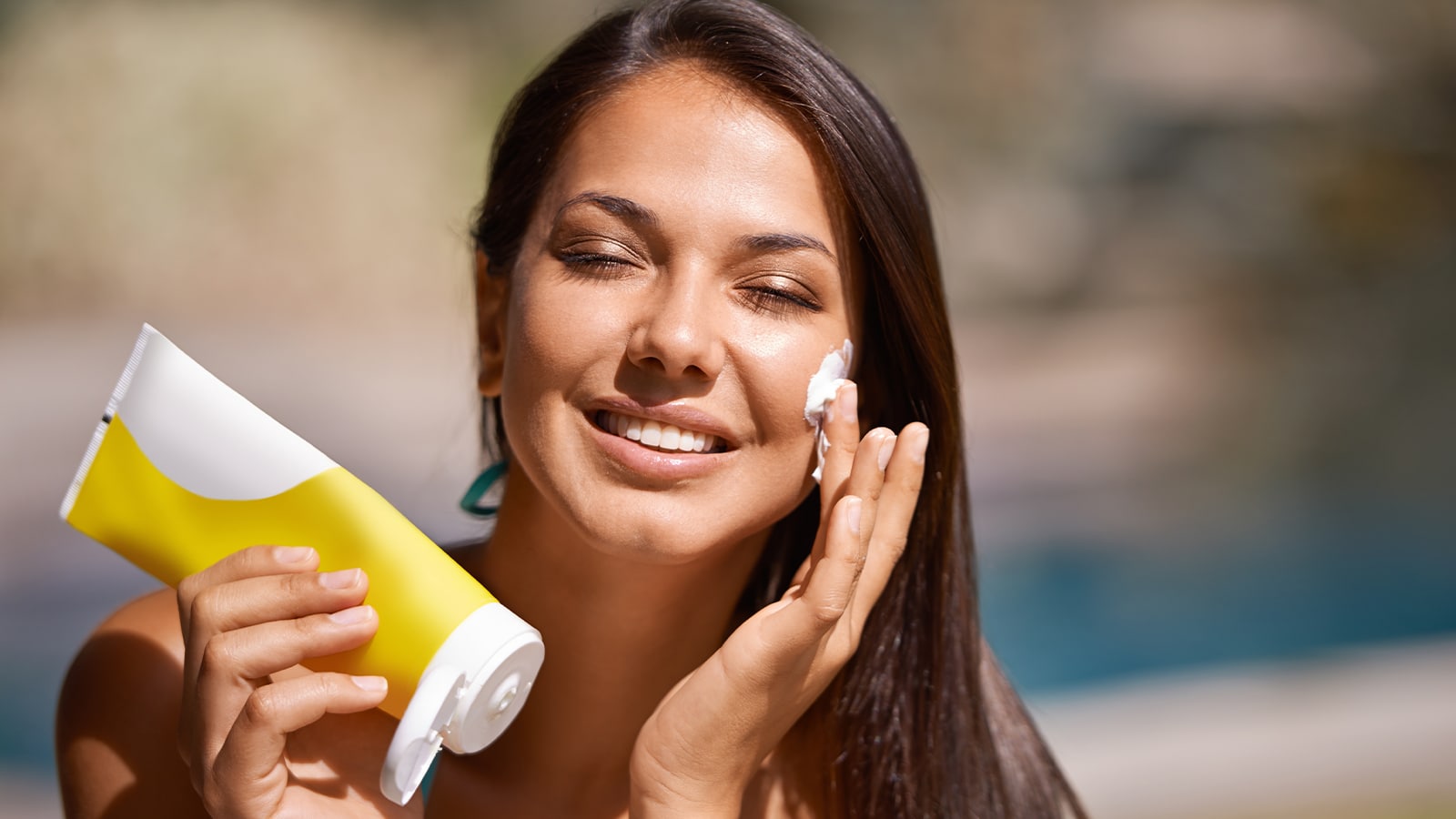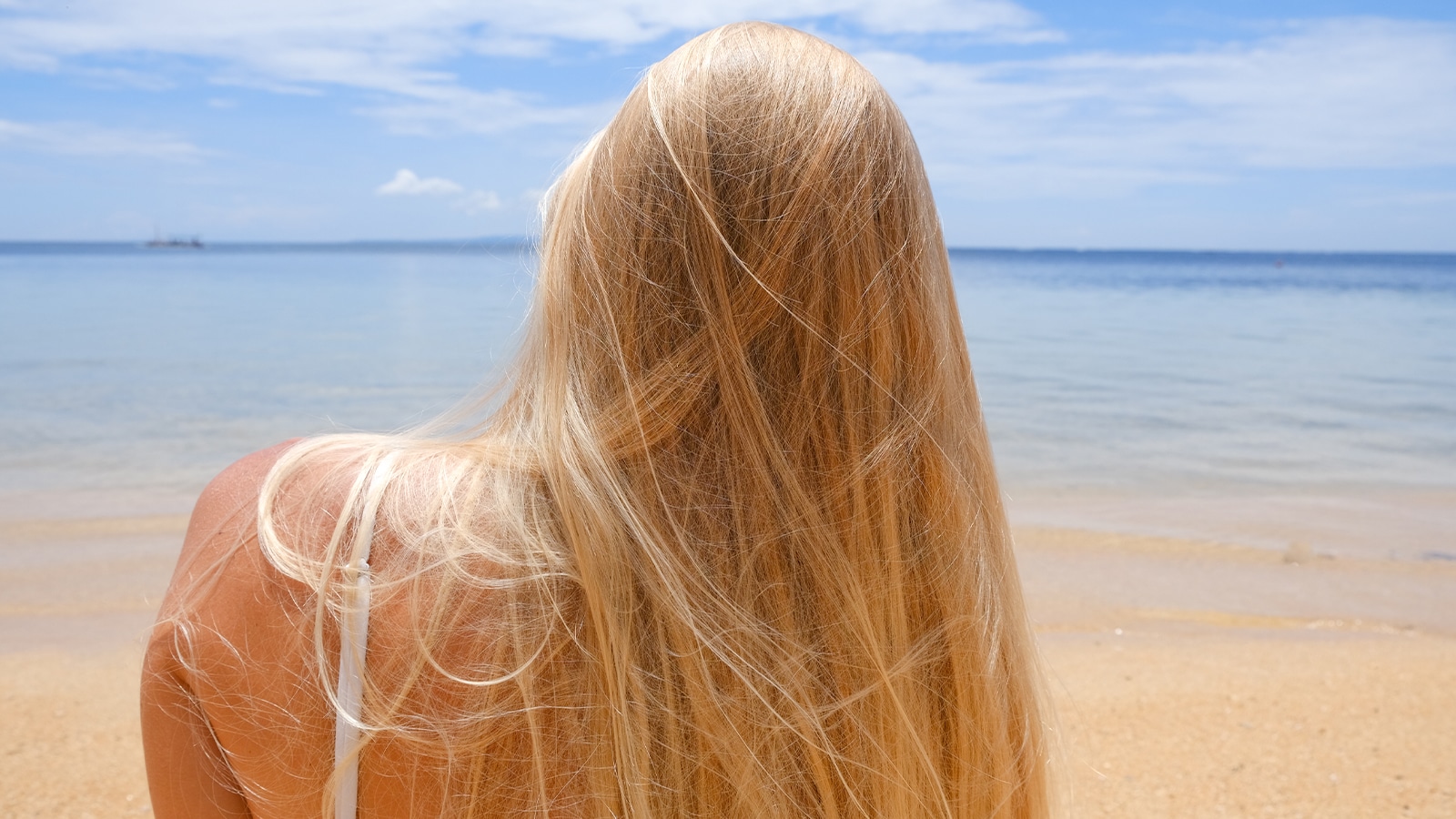 June 20, 2024 | Hair Tips
June 20, 2024 | Hair TipsIt’s summertime, and you’re ready to show off in the sun with your stunning hair extensions. But, did you think about the damage sunscreen may cause? Sunscreen is great for your skin, protecting it from the sun’s harsh rays. Yet, some of its ingredients are not so friendly to your locks. They can cause your hair to change color, react badly, and get damaged.

Blonde hair extensions are at risk of turning odd colors like peach or salmon because of sunscreen ingredients like avobenzone and octocrylene. These ingredients are good at blocking UVA rays. However, when they mix, they can cause a chemical reaction that stains your hair. The harm can be pretty serious, which makes stopping it before it starts very important.
But here’s the good news: you don’t have to miss out on sun protection because you’re afraid of damage. By learning how sunblock and extensions interact, you can choose your sunscreen wisely and lower the risk of harm. This article will go into the potential issues with hair extensions from sunscreen. We’ll also look at ways to make sure your extensions stay beautiful all summer.
Key Takeaways
- Sunscreen ingredients like avobenzone and octocrylene can cause discoloration and damage to hair extensions, especially blonde or light-colored ones.
- Chemical reactions between sunscreen and hair extensions are more likely to occur when exposed to UV light.
- Preventing damage is easier than trying to reverse it, so taking precautions is crucial.
- Mineral sunscreens containing titanium dioxide or zinc oxide are less likely to cause damage to hair extensions compared to chemical sunscreens.
- Proper care and maintenance of hair extensions, such as gentle washing and conditioning, can help minimize the risk of damage from sunscreen and other environmental factors.
Introduction

Summer means enjoying the sun, but it also means protecting your skin. For those wearing hair pieces, if they’re made from synthetic human hair, you might worry about how sun cream affects them.
To prevent sunscreen products from staining your hand tied hair extensions, avoid direct contact or choose sun creams or sprays without Avebenzone. If they do get stained, there’s a process to make them look new again. Just remember to think carefully about your extensions when using sunblock.
Avebenzone protects for around 30 minutes. Iron in water reacts with sunscreens, causing hair extensions to change color.
We will cover how sunscreen can affect hair extensions, what damage it might cause, which ingredients to look out for, and how to pick sunscreens that are safe for your hair. Understanding these points will let you enjoy wearing your hair pieces during the summer. You can keep your skin safe and make sure you’re keeping your hair looking great.
Interaction Between Sunscreen and Hair Extensions
The effect of sunscreen on them can be complex, influenced by factors like the sunblock type, how it’s put on, and the environment.

Application Process
It’s vital not to get sunblock on your extensions. This might be hard with long hair or close extensions. To avoid contact, put your hair in a bun or ponytail. Also, do the application inside, without any wind to blow it onto your hair. This allows you to apply it without worrying about contact with the sunscreen to your new hair.
Pick mineral sunscreen over chemical ones. Mineral sunscreens, containing titanium dioxide and zinc oxide, are safer for extensions. Chemical sunscreens might damage them, causing discoloration or other problems.
Environmental Exposure
Even with care, your hair might still meet sunblock through environmental routes. Whether hitting the beach or heading to the pool, going for a swim or shower while wearing sunscreen can lead to contact.
Per a Journal of Cosmetic Science study, extensions under sunlight and water faced more discoloration and damage.
Exposure to damaging UV rays is also critical. It can start chemical reactions between ingredients in some sunscreens and extension materials, causing damage.
| Type of Sunscreen | Potential for Hair Extension Damage |
| Mineral Sunscreen | Low |
| Chemical Sunscreen | High |
| Coconut Oil | For Skin & Hair |
It’s key to know that the damage caused by sunscreen will make it possible you have to repair or replace your extensions. Many sunscreens have ingredients, like butyl methoxydibenzoylmethane, that can create a chemical reaction when they come in contact with extensions. These can change the color, feel, and strength of your hair.
Chemical Reactions
Ingredients like Avobenzone and Octocrylene are two ingredients that react to UV radiation. This can damage your extensions by breaking down their cells. Blond extensions are especially at risk of turning bad from these reactions.
Discoloration
Sunscreen can make extensions change color, often to a peach or salmon shade. Fixing this color can be tough and might need the help of a stylist from Trademark Salon.
Texture Changes
Once the sunscreen is absorbed in your hair, it can make it more dry and brittle. This leads to more tangles and breakage. It’s a bigger issue for blond extensions and can potentially ruin your hair.
Sunscreen Ingredients and Their Effects on Hair Extensions
To keep your hair extensions safe in the sun, knowing what’s in your sunscreen matters. Some ingredients in sunscreens can harm or change the color of your extensions. It’s important to learn about these ingredients and how they affect your hair.
Oxybenzone
Oxybenzone blocks UV light well and fights signs of aging. But, it can mess with your hormones and sometimes cause skin allergies. For hair extensions, oxybenzone can make colors fade and the bonds weak.
Avobenzone
Avobenzone is great at blocking many UV rays. Yet, it might disrupt hormones and possibly mix with cancer-causing agents. When on hair extensions, it can turn the color to pinkish-peach or orange.
Octocrylene
Octocrylene is used to keep avobenzone working well. But it can also join in the harmful chemical reactions. This may lead to more color changes and weaker extension bonds.
Titanium Dioxide and Zinc Oxide
Titanium dioxide and zinc oxide are safer for hair extensions. These minerals give good UV protection without causing harm. When you’re shopping for sunscreen, choose those with these mineral ingredients.
| Ingredient | Effects on Hair Extensions |
| Oxybenzone | Can cause discoloration and weakened bonds |
| Avobenzone | May lead to pinky-peach or orange discoloration |
| Octocrylene | Can contribute to chemical reactions causing damage |
| Titanium Dioxide | Generally considered safe for hair extensions |
| Zinc Oxide | Provides effective UV protection without harmful reactions |
It’s good to know how sunscreen can affect your hair extensions. Choosing mineral-based sunscreens and avoiding harmful ingredients like oxybenzone, avobenzone, and octocrylene is smart. This can prevent damage and keep your extensions looking great all summer.
Choosing Sunscreens With Hair-Safe Ingredients
Selecting the right sunscreen is key to protecting your hair extensions. Look for mineral sunscreens with titanium dioxide and zinc oxide. These ingredients protect your hair without causing any damage.
Avoid sunscreens with harmful contents like Avobenzone or Oxybenzone. They might make your hair look brassy or dull, which is hard to fix.
It’s crucial to use the right sunscreen to keep your hair extensions healthy. Mineral-based sunscreens with safe ingredients let you enjoy the sun safely.
When buying sunscreens, choose those made for hair. Products like Oribe Invisible Defense Spray or the Goldwell Brilliance Serum Spray are good. Brands like Bare Republic and Sun Bum offer sunscreens that won’t harm your hair extensions.
| Brand | Product | Key Ingredients | Benefits |
| Bare Republic | Mineral SPF 30 Body Sunscreen Lotion | Titanium Dioxide, Zinc Oxide | Non-greasy, water-resistant, reef-friendly |
| Alba Botanical | Sensitive Mineral Sunscreen SPF 30 | Titanium Dioxide, Zinc Oxide | Fragrance-free, hypoallergenic, biodegradable |
| Sun Bum | Mineral SPF 50 Sunscreen Lotion | Zinc Oxide | Lightweight, non-greasy, vegan |
Look for sunscreens with titanium dioxide and zinc oxide. They keep your hair extensions safe from the sun. Always do some research when buying a sunscreen. This can help keep your extensions looking great all summer.
Repairing Damaged Hair Extensions
If your hair extensions got damaged by sunblock, act fast to fix them. Start by washing your extensions thoroughly with a clarifying shampoo like Cleanse by Oribe or Head Remedy by KMS. It’s important to use this kind of shampoo as it cleans the hair deeply, getting rid of sun creams, chlorine, and saltwater after sun exposure.
Next, give your extensions a deep conditioning treatment by Oribe, KMS, or Goldwell. These will moisturize and repair your hair. Focus on the tips of the extensions, where damage is often the worst. Follow the directions on the mask for how long to leave it in, then rinse well.
When to repair
If your extensions are a bit damaged but still look okay, you can repair them. Signs they can be fixed include:
- Mild discoloration or brassiness
- Slight dryness or frizziness
- Minimal shedding or tangling
Use a mix of clarifying shampoo, deep conditioners, and be gentle when styling them. This can make your extensions look good again.
When to replace
Sometimes, hair extensions are too damaged to fix. You might need new ones if:
- They’re very discolored or the texture changed
- They shed a lot or tangle badly
- The hair is matted or clumped
Always talk to your hair extension experts at Trademark Salon. They’ll check the damage and give you advice for what’s best for your hair. It’s possible you might need an extension reblending or a simpler fix.
Remember, it’s easier to keep your extensions healthy than to fix them. Protect them from the sun and other damage to enjoy beautiful hair for longer.
Summary
Sunscreen can damage extensions, especially light ones. It’s because some sunblock ingredients can react badly with hair. This leads to color change, texture loss, and weaker hair bonds.
To avoid this, pick sunscreens with safe ingredients using a mineral-based product like titanium dioxide and zinc oxide. Avoid ones with Avobenzone, Octocrylene, and Oxybenzone. These can hurt your hair extensions the most.
If your extensions get hurt by sunscreen, act fast. Use a clarifying shampoo by Oribe or KMS to clean the hair. Then, use a deep conditioner to add moisture back.
It’s smart to talk to a hair extension pro. They can figure out if your extensions need to be fixed or replaced. They’ll give you the best advice for your case.
Knowing about sunscreen and extensions can help you enjoy the sun safely. Use hair-friendly sunscreens and wash your hair after swimming. Keep up with conditioning to make your extensions look great all summer.
With a few extra steps, you can wear your extensions with pride. You’ll know they’re safe from harmful sunscreens and other elements.
Frequently Asked Questions
Can sunscreen cause damage to hair extensions?
Yes, sunscreen can harm hair extensions, especially if they are blonde or light. It happens because certain sunscreen ingredients react under UV light. This reaction can lead to discoloration and damage.
Are blonde hair extensions more prone to damage from sunscreen?
Yes, blonde hair extensions are more likely to turn peachy or salmon from some sunscreen ingredients. It can be hard to fix this damage, so it’s best to avoid it.
How can I minimize the risk of sunscreen damaging my hair extensions?
To prevent sunscreen damage, don’t let it touch your hair. Wear your hair up and apply sunscreen indoors. Use mineral sunscreens with titanium dioxide and zinc oxide. These are safer for hair extensions.
What are the signs of sunscreen damage on hair extensions?
The signs of sunscreen damage include color changes, especially in blonde hair. You might also see your hair becoming drier or brittle.
Which sunscreen ingredients should I avoid to protect my hair extensions?
Avoid sunscreens with Avobenzone, Octocrylene, and other ingredients like Oxybenzone. These chemicals are more likely to damage hair extensions in the sun.
What should I do if my hair extensions have been exposed to sunscreen and show signs of damage?
If sunscreen has already damaged your hair extensions, act fast. Wash with a clarifying shampoo to remove residue. Then, use a deep conditioning mask. Talk to your specialist about repairs or replacement.
Are there any sunscreens specifically formulated for use around hair extensions?
Some sunscreens are safe for use with hair extensions, like Oribe Invisible Defense Spray. Brands such as Bare Republic, Alba Botanical, and Sun Bum make mineral sunscreens that are less harmful.
